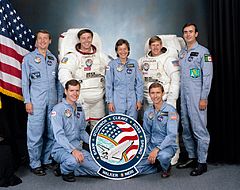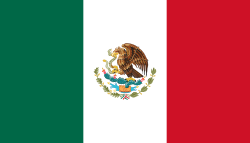STS-61-B
| STS-61-B | |
|---|---|
| Znak expedice | |
 | |
| Údaje o expedici | |
| Loď | Atlantis |
| COSPAR | 1985-109A |
| Členů expedice | 7 |
| Trvání | 6 dní, 21 hodin a 5 minut |
| Datum startu | 26. listopadu 1985 07:29:00 EST |
| Kosmodrom | Kennedy Space Center, Florida (USA) |
| Vzletová rampa | 39-A |
| Datum přistání | 3. prosince 1985 01:33:49 PST |
| Fotografie posádky | |
 | |
| Navigace | |
| Předcházející | Následující |
| STS-61-A | STS-61-C |
STS-61-B byla mise raketoplánu Atlantis. Celkem se jednalo o 23. misi raketoplánu do vesmíru a 2. pro Atlantis. Cílem letu mise bylo vynesení komunikačních satelitů MORELOS-B, AUSSAT-2 a SATCOM KU-2 na oběžnou dráhu. Uskutečnily se dva výstupy do otevřeného prostoru (EVA).
Posádka
 Brewster H. Shaw Jr. (2) velitel
Brewster H. Shaw Jr. (2) velitel Bryan Daniel O'Connor (1) pilot
Bryan Daniel O'Connor (1) pilot Mary L. Cleaveová (1) letový specialista 1
Mary L. Cleaveová (1) letový specialista 1 Sherwood C. Spring (1) letový specialista 2
Sherwood C. Spring (1) letový specialista 2 Jerry L. Ross (1) letový specialista 3
Jerry L. Ross (1) letový specialista 3 Rodolfo Neri Vela (1) specialista pro užitečné zatížení 1
Rodolfo Neri Vela (1) specialista pro užitečné zatížení 1 Charles D. Walker (3) specialista pro užitečné zatížení 2
Charles D. Walker (3) specialista pro užitečné zatížení 2
V závorkách je uvedený dosavadní počet letů do vesmíru včetně této mise.
Výstupy do vesmíru (EVA)
- EVA 1: 19. listopadu - 5 hodin, 32 minut (Ross a Spring)
- EVA 2: 1. prosince - 6 hodin, 41 minut (Ross a Spring)
Reference
V tomto článku byl použit překlad textu z článku STS-STS-61-B na anglické Wikipedii.
Externí odkazy
 Obrázky, zvuky či videa k tématu STS-61-B ve Wikimedia Commons
Obrázky, zvuky či videa k tématu STS-61-B ve Wikimedia Commons - (anglicky) Stránka o letu na stránkách NASA
Média použitá na této stránce
STS-61-B mission patch
This is the insignia designed by the STS-61B crewmembers to represent their November 1985 mission aboard the Space Shuttle Atlantis, depicted here in earth orbit, making only its second space flight. The design is surrounded by the surnames of the seven crewmembers.
The crew assigned to the STS-61B mission included (kneeling left to right) Bryan D. O'conner, pilot; and Brewster H. Shaw, commander. On the back row, left to right, are Charles D. Walker, payload specialist; mission specialists Jerry L. Ross, Mary L. Cleave, and Sherwood C. Spring; and Rodolpho Neri Vela, payload specialist. Launched aboard the Space Shuttle Atlantis November 28, 1985 at 7:29:00 pm (EST), the STS-61B mission's primary payload included three communications satellites: MORELOS-B (Mexico); AUSSAT-2 (Autralia); and SATCOM KU-2 (RCA Americom. Two experiments were conducted to test assembling erectable structures in space: EASE (Experimental Assembly of Structures in Extravehicular Activity), and ACCESS (Assembly Concept for Construction of Erectable Space Structure). In a joint venture between NASA/Langley Research Center in Hampton, VA and Marshall Space Flight Center (MSFC), the Assembly Concept for Construction of Erectable Space Structures (ACCESS) was developed and demonstrated at MSFC's Neutral Buoyancy Simulator (NBS). The primary objective of this experiment was to test the ACCESS structural assembly concept for suitability as the framework for larger space structures and to identify ways to improve the productivity of space construction.



